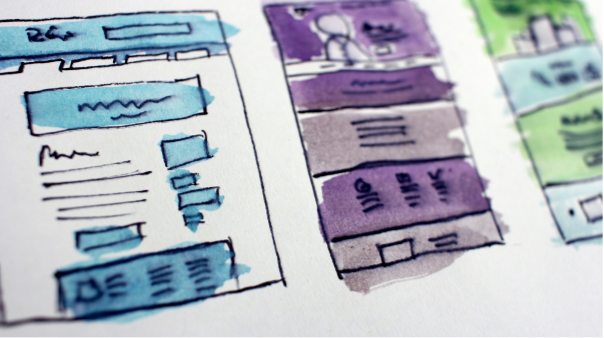Launching your business online is an exciting step, but many aspiring entrepreneurs in Singapore find themselves asking the same crucial question: How much does it cost to build a website in Singapore? With an abundance of web agencies, freelancers, and DIY options, understanding the true cost can feel overwhelming.
In 2026, the cost of building a website in Singapore can vary greatly based on several factors such as the complexity of the project, the size of the company, and the level of expertise required. But in a time where GST and inflation are at an all-time high, is it still worth it to invest in a well-designed site? Absolutely. But I’ll get to that in a bit.
In this comprehensive guide, we’ll break down all the factors that affect website pricing in Singapore, compare popular development options, and reveal hidden costs you might not expect. Whether you want a simple business site or a robust ecommerce platform, this article will arm you with the knowledge you need to confidently invest in your first website—and set your business up for digital success.
Whether you're a small business owner or a multinational organisation looking to revamp your corporate website, understanding the cost of building a website in Singapore is crucial in ensuring that you get the most out of your investment.
Related: Discover our comprehensive guide on how to start a business in Singapore.
Who needs a website in Singapore?
1. Business owners who need a company website
A company website is a must-have for all business owners in the modern age. It serves as an online representation of the company. This allows businesses to showcase the brand, share company news, and provide a platform for their customers to reach out to them.
With a website, business owners can establish their brand, increase their visibility, and reach a wider audience, regardless of geographical location. A website also provides a valuable tool for businesses to market their products and services, but I’ll get to the specifics in a minute.
Whether you are a small business or enterprise owner, a website is absolutely necessary.
2. Those who need their own website as a professional portfolio
There’s only so much a resume can do for you when it comes to telling your story. With that limited amount of space and word count on the document, you aren’t really able to share all the exciting projects you’ve worked on.
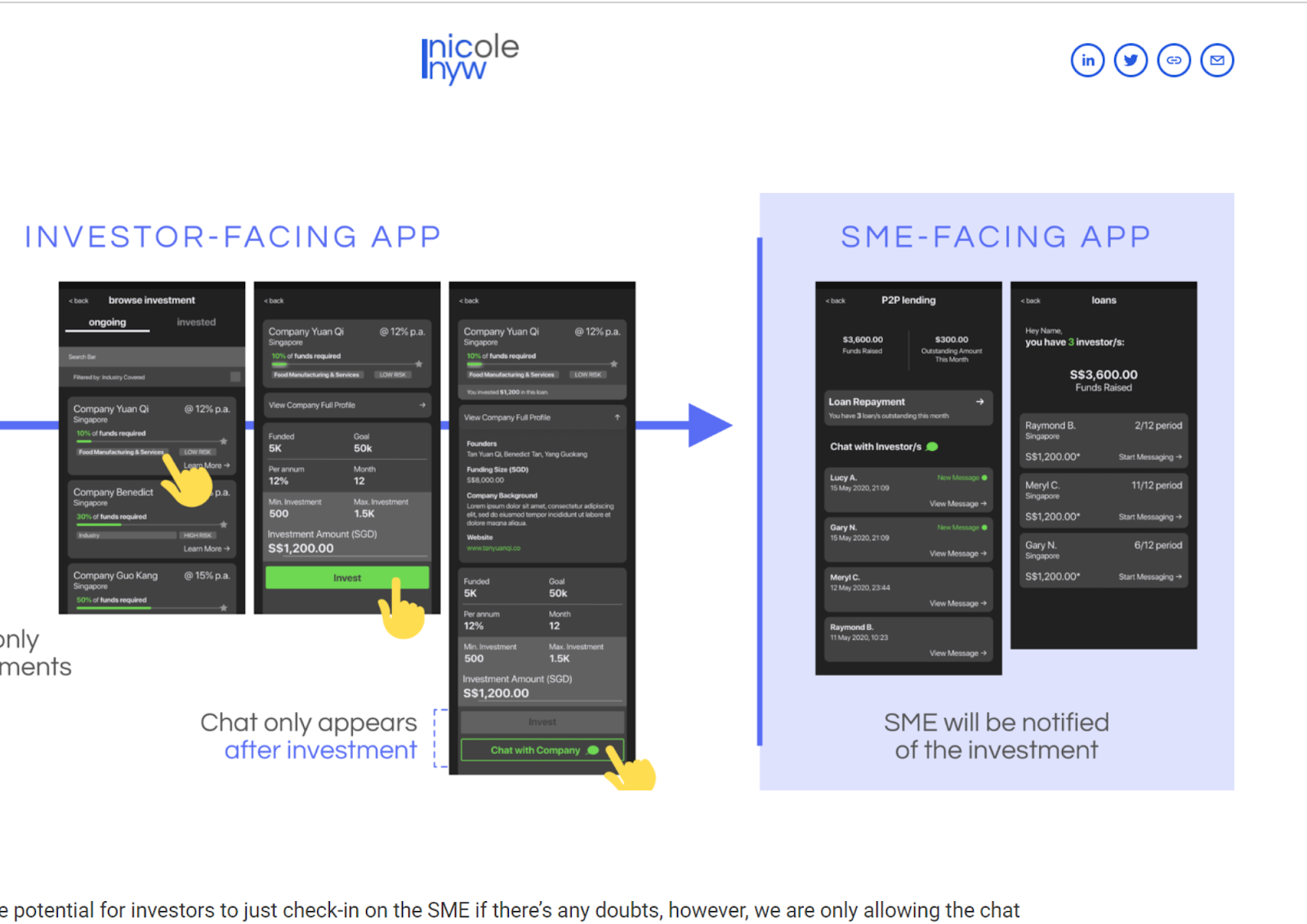
Creating your own website to showcase your work is a great way to not only list your professional achievements but also share details about your work that would otherwise have been removed from your resume due to space constraints.
For instance, you get to talk in detail about the scope of work, how you came up with the strategy, a complete list of actions you took, obstacles you encountered along the way, how you solved them, and the results achieved.
They say a picture is worth a thousand words. But a portfolio site with many pictures and graphics? Gosh, you’ll have enough words to write a script for a Hollywood film!
3. Personal or business bloggers
Blogging has become a popular way for individuals and businesses to share their thoughts, ideas, and experiences with the world. A website is a crucial tool for bloggers to reach a wider audience and showcase their content.
For personal bloggers, a website offers a platform to express their opinions and share their interests with a global audience. It provides them with a space to build their online presence and connect with others who share their passions. Personal bloggers can use their websites to establish their brand and establish themselves as experts in their field.

For business bloggers, a website is an essential tool for building their brand, generating leads, and growing their customer base. Business bloggers can use their websites to provide valuable information to their target audience, educate them about their products and services, and establish themselves as thought leaders in their industry. A website also provides a way for businesses to reach a larger audience and showcase their products and services to potential customers.
Whether it is for personal or business purposes, having a website is a critical tool for bloggers to showcase their content, build their brand, and connect with their audience.
Benefits of having a well-designed website in Singapore
1. Cementing an online presence
No business is complete without a website. If there’s anything the COVID-19 pandemic has taught businesses, it’s that they must cement an online presence. Or shut down.
Robinsons shut down its final store during the pandemic after a whopping 162 years of operations on this island. Prior to this, the brand had always had a heavier focus on its physical store and placed less emphasis on solidifying an online presence.
If it had started to build a robust online presence earlier, it could’ve avoided its fate. And that’s because customers would have already found an alternative and efficient channel to make purchases.
If you’re not in the commerce space, having a site also helps you achieve other marketing objectives like driving conversions in the form of newsletter subscriptions or product demo signups. If you are a business owner, establishing an online presence via a company website is absolutely necessary.
2. Growing your brand awareness through Search Engine Optimisation (SEO)
Content published on a website is managed by a content management system (CMS). And the backend of CMSes allows you to upload written content and format certain HTML elements like your header tags, meta description, and page title. Doing so not only gives Google a better idea of how your content is structured when its bots crawl your site.
The backend of an ideal Content Management System should make it super easy for you to assign header tags to structure your website’s content.
This forms a good foundation for your SEO efforts as Google is able to better understand your content and match its intent to the queries people are searching for in their browsers. And when they say content is king, they mean it.
Doing in-depth keyword research for topic clusters, publishing large amounts of content, and then ranking them for keywords, is a great way to drive organic traffic to your website and grow your online presence.
3. Creating a good impression and earning site visitors’ trust
A well-designed website is crucial for creating a good impression and earning the trust of site visitors. And this is more important for your digital marketing efforts than you think. A clean and user-friendly layout, along with engaging visuals and text are all important factors when it comes to creating a positive experience for visitors.
But to truly make an impact, you need to showcase your credentials and make yourself or your business appear professional and trustworthy. And this can be done in several ways.

The first way is to showcase certain badges accorded by credible sources in the industry. For example, those in the software-as-a-service (SaaS) world would be aware of the trust badges issued by G2, a world-renowned software review site. Having badges like these serve as great social proof of their product or service quality. You can see badges like these on many websites of startups.
Having a well-thought-out site would also include a section where they can list the brands they work with. This is especially important if the business has worked with big brands before. Site visitors can develop a greater sense of trust in the business.
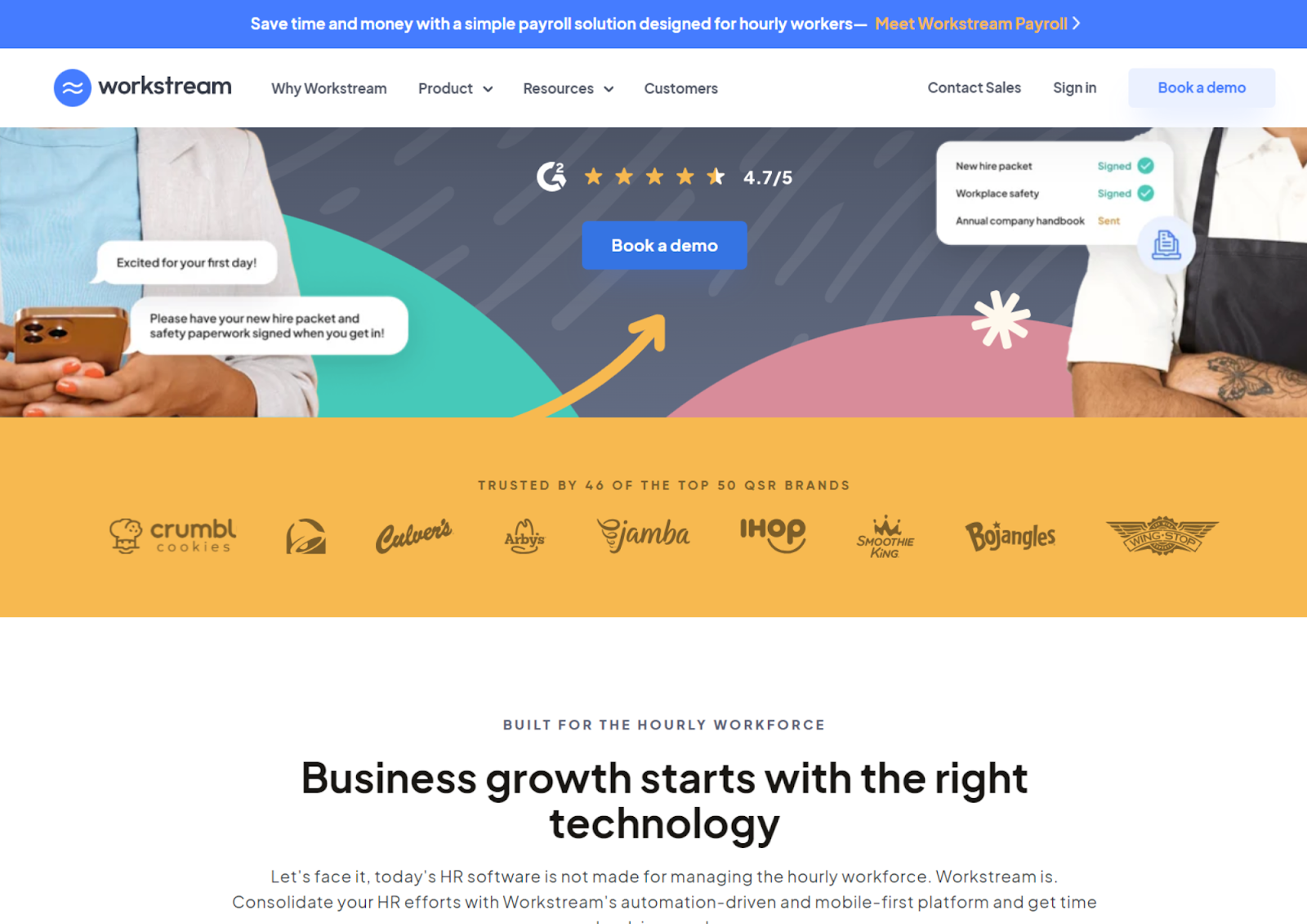
Hiring software Workstream works with franchisees in the US to automate the hiring of hourly workers. And as you can see on their site, they list all the brands they’ve worked with. Some of which, are really established ones.
4. Lead generation
A well-designed website can play a crucial role in helping a business generate leads. Having a website that is visually appealing, easy to navigate, and provides a positive user experience can increase the chances of attracting potential customers and driving conversions.
Your leads can come in the form of newsletter subscriptions, product demo signups, or webinar registration.
This can be done by incorporating specific lead generation tactics, such as lead capture forms, click-to-call widgets, chatbots, or live chat. In this way, a well-designed website can serve as a powerful tool for driving growth and success for a business.
What influences the cost to build a website in Singapore?
Before you set your budget, it’s vital to understand the key factors affecting your website design pricing in Singapore. Every business has unique requirements—your choices in design, functionality, and provider will dramatically influence your overall cost.
1. Type and complexity of website
The single biggest driver of your website development cost is the type of website you need and its complexity. Do you want a simple small business website, a robust ecommerce site, or a custom website with advanced features and integrations? Depending on the need for specific website functionality, developing and designing your site can get a little more complex.
The more complex your site, the higher the average cost.
- Basic website: 5–10 pages, usually with a contact form and essential information. Minimal plugins or custom functionality.
- Corporate website: 10–30+ pages, advanced functionality such as employee directories, secure logins, and possibly multi-language support.
- Ecommerce website: Product listings, shopping cart, payment gateways, order management, and inventory tracking.
- Custom website/web applications: Unique features, animations, and integrations not available in standard templates.
Here's an example of a custom feature that adds to the complexity of your website and can result in a higher cost.
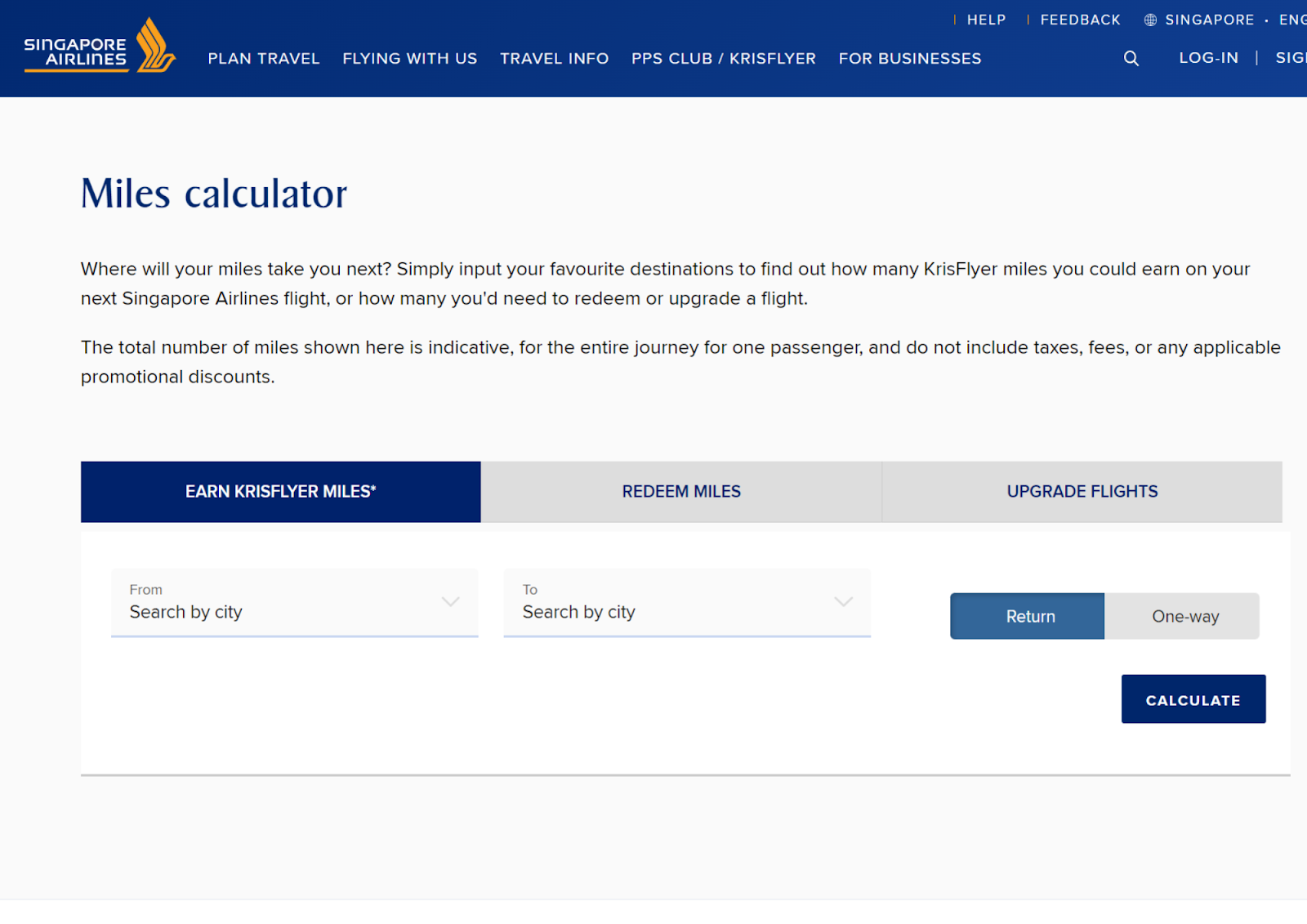
Singapore Airlines has a miles calculator on their site. Apart from needing to think about the aesthetic side of things, their web designers also need to consider the user experience (UX) of an online application. That’s a field that many web designers may not have and adds another layer of complexity to the process.
2. Custom design vs. templates
Your choice between a custom design and off-the-shelf templates also affects pricing. Custom web design offers a unique look and user experience tailored to your brand, but requires more design hours and higher web design cost. Templates are pre-built and can be launched quickly at a lower cost.
- Templates: User-friendly, affordable, and allow for rapid deployment, but may limit branding and advanced features.
- Custom design: High-quality, tailored to your business needs, ensures your site stands out and provides an optimal user experience, but increases overall cost.
For instance, many Singaporean local SMEs start with a template and invest in customizations as their business grows, balancing budget with scalability.
3. Features and functionalities
Every new feature, plugin, or integration adds to your website development cost. Business owners must decide what’s necessary for their target audience and what can wait.
Must-have features:
- Mobile responsiveness for all mobile devices
- Contact form and WhatsApp integration
- Basic SEO and search engine optimization
- SSL certificate for security
Advanced features:
- Live chat, booking systems, member areas, advanced analytics
- E-commerce functionality: shopping cart, payment gateways, inventory management
For example, adding online payment gateways to your e-commerce website can increase the cost by SGD 500–2,000, depending on integration complexity.
4. Content management system (CMS) selection
The CMS you choose affects both pricing and website functionality. For many beginners, they will start off with a basic website from a site builder before moving on to more complex builds as their business needs evolve.
- Site Builders (such as GoDaddy): Easiest for beginners, often including AI features to help build your website with no technical skills needed.
- WordPress: Most popular for SMEs, highly scalable, with thousands of plugins and templates.
- Custom CMS: Tailored to unique business needs; highest cost and complexity.
5. Number of web pages
The number of pages (site size) is a simple but crucial factor. Each page requires design, copywriting, and SEO optimization.
- Small business website: 5–10 pages
- Corporate website: 20–50+ pages
- Ecommerce website: May require hundreds of product pages
Plan your website content in advance to avoid scope creep and unexpected revisions, which can drive up pricing.
6. Experience level of the person or web design agency doing it
If you do decide to outsource the web design work to an independent contractor or web design agency, the prices you’ll be quoted can vary greatly. More experienced contractors and freelancers tend to charge more for their work. So will more established agencies.
Breakdown of website costs by type of website
Let's break down the typical price range for different website types in Singapore, including key features and considerations based on your type of business.
1. Basic informational websites
A basic informational website is a simple website primarily used to present essential information about a business, individual, or organization. It focuses on introducing the brand, explaining services or products, sharing background details, and providing contact information—all packaged within a clean, user-friendly design. These sites are usually simple in design and do not include advanced features such as shopping carts, payment gateways, or custom web applications. Typical pages included in such a website include: Home, About, Services, Contact, basic blog.
Such a website is ideal for the following profiles and businesses that want a professional online presence without the need for complex functionality or advanced features.
- Startups and Small Businesses: New companies or SMEs who want to establish credibility, share their story, and make it easy for potential customers to reach them.
- Freelancers & Solo Professionals: Consultants, coaches, designers, and other service providers who need a digital portfolio, testimonials, and a clear way for clients to connect via a contact form or WhatsApp link.
- NGOs & Community Groups: Organizations that need to communicate their mission, share updates, and publish contact details.
- Personal Brands: Individuals such as speakers, authors, or artists who want to showcase their work and provide background information.
- Corporate Profiles: Companies that require a simple corporate website to present their business overview and contact information.
The cost of building a basic informational website can start from SGD 150–500 if you use DIY website builders, up to SGD 500–1,500 if you engage a freelancer or SGD 1,000–3,000 if you choose to use a web design agency.
2. Small business websites
Small businesses would usually require slightly more features than a basic informational website. As such, small business websites typically include additional functionality—such as lead capture forms, galleries, testimonials, blog sections, and sometimes even basic e-commerce features—to better engage potential customers and support a business’s growth. These websites are built with user-friendly navigation, responsive design for mobile devices, and a focus on high-quality content that aligns with the business’s goals.
The cost for a small business website is influenced by the number of pages, level of custom design, choice of content management system (such as WordPress), and whether you hire a freelancer or a web design agency. It can start from SGD 150–800 (excluding ongoing costs and advanced features) for DIY website builders to SGD 1,000–3,000 for freelancers and SGD 2,500–6,000 if built by a web design agency.
3. E-commerce websites
An e-commerce website is a specialized online platform designed to help businesses to sell products or services online. It integrate advanced features such as a shopping cart, payment gateways, product catalogues, customer accounts, and order management systems. These platforms are built to ensure seamless transactions and a secure, user-friendly experience for both business owners and customers.
Most e-commerce websites will include a Product catalog, shopping cart, payment gateways (PayNow, credit card), order and inventory management, and have a mobile responsive design.
Given the features required, you will be looking to pay anywhere from hundreds to tens of thousands. For reference, a freelancer will charge around SGD3,000 to SGD10,000 while a web design agency can cost you anywhere between SGD6,000 to SGD20,000+.
4. Custom-built or web applications
A custom-built website or web application is a highly tailored digital solution created from the ground up to meet specific business needs that go beyond standard websites. Unlike standard templates or off-the-shelf platforms, these projects involve bespoke design and web development, offering advanced features, unique functionality, integrations with third-party systems, and full control over the user experience and scalability. Some examples include member portals, SaaS solutions, complex HR or CRM systems, booking engines etc.
Due to its complexity, the cost for such custom projects is significantly higher, owing to the complexity, advanced features, and intensive design and development hours required. Pricing depends on the number of pages/screens, depth of functionality, custom integrations (like payment gateways, APIs, ERP/CRM), mobile responsiveness, and any advanced features like animations, real-time dashboards, or user management.
Most organizations will engage a web design agency for such projects, which can cost anywhere between SGD 15,000 to SGD 50,000 and more, with an additional monthly budget of SGD1,000 + per month for ongoing maintenance, support, updates, and scalability improvements.
5. Landing pages & microsites
If you are looking for a one-off website to launch a new product or campaign, you can look into building a single landing page or microsite. These are usually a small, stand-alone website—typically ranging from a single page to just a few pages created to support a particular campaign, product launch, or event, offering a more immersive experience than a traditional landing page. These are built for high conversion, streamlined functionality, and clear messaging, often with a professional web design tailored to a specific target audience.
Depending on the complexity of the deisgn, expect to pay around SGD 50 to SGD 200 if you choose the DIY route, or SGD 200 to SGD 800 for a freelancer-built website or SGD 500 to SGD 2,000 if you decide to go with a web design agency.
How to build a website in Singapore? Comparing website development providers
Your choice of provider—agency, freelancer, or DIY—will directly impact your website design pricing, service level, and ongoing maintenance.
1. Web design agencies
Hiring a website design firm in Singapore is starts from SGD 2,500 and can stretch to SGD 50,000+, depending on project scope. For most companies building a small business website, expect to pay approximately SGD 6,000 and typically includes an annual website design fee of SGD 1,000. This is best suited for companies with a large budget and seeking a strategic partner, scalability, or a professional website with advanced features.
Always get quotes from multiple providers with client testimonials to compare prices.
The cost is contingent on the number of pages your website has, the types of modifications requested, and the specific functionality you need. It's also important to factor in the necessary website builder and software tools for website creation.
| Pros | Cons |
| You have a team of experts working on your website. Full-service web design services, project management, access to design, development, and digital marketing experts. | It is (very) expensive. |
| A web design agency also often doubles as a web development agency and can help you with performance issues and UI/UX. This includes a dedicated project manager. | You may be able to only request a limited number of revisions. |
| Many web design agencies also have digital marketing capabilities. This helps ensure that your site is SEO-friendly. Depending on your package, some even help you write and publish search-optimised content. | May be less flexible for smaller projects. |
2. Freelancers
The hourly rate for a professional web designer varies between SGD 25 and SGD 200 (yes, that’s a huge range). And this depends on factors such as their location, experience, technical skills, and level of proficiency.
Always ask freelancers to show you their portfolio before signing a contract with them.
On average, an experienced designer can be hired for around SGD 75 per hour. Of course, the larger the number of pages you need, the more expensive it will be. Therefore, expect to pay around SGD 800 for a simple website. This figure could go up to SGD 10,000+ if you are building a complex website with many tool and features.
They also tend to be more flexible and more willing to give in to customer demands than web development agencies. Especially those you find on freelancing platforms. This is due to the importance of customer reviews in helping them get more clients. Many Singapore freelancers now offer bundled web design services, including copywriting and basic SEO, to better serve the needs of local SMEs.
| Pros | Cons |
| (Can be) much cheaper. | Good ones are (very) expensive. |
| Higher flexibility, likely to provide a larger number of revisions to their designs. | Limited capacity, may not be able to provide support areas like as web development and marketing as they don’t always work with a team of people. |
| Suitable for small business website projects. |
DIY Website Builders
Designing a website on your own in Singapore can be a cost-effective option, but it still requires some expenses for hosting, domain names, and website builders. DIY is great for MVPs or validating your online store idea.
The cost of hosting your website can range from around SGD 10 to SGD 50 per month, depending on the type of hosting service you choose and the size of your website. For example, shared hosting is typically more affordable, while dedicated hosting is more expensive.
A domain name typically costs around SGD 10 to SGD 15 per year. Some website builders offer a free domain name when you sign up for an annual plan, so be sure to check for any such deals.
Website builders usually charge a monthly fee, ranging from SGD 5 to SGD 50 or more, depending on the features and tools you require. Some website builders like GoDaddy offer free plans with limited features, while others, such as WordPress, offer a free platform but charge for certain plugins and themes.
While the cost of building a website can vary, it is still cheaper than the previously mentioned options given that you don’t pay for the man-hours needed to do the work since you are designing the site yourself.
| Pros | Cons |
| Cheapest option of all. | If you are new to it, learning how to do it from scratch can be super time-consuming. |
| Complete freedom to do whatever you want | You are uncertain about determining things like the best hosting provider, website builder, and domain registrar. |
| Quick launch, easy to use for non-tech business owners | Limited customization, ongoing costs, may lack high-quality design or advanced functionality. |
Building a website in Singapore: essential cost components explained
Understanding each component of your web design project ensures you don’t miss key expenses or hidden costs.
1. Domain name registration
- What it is: Your website’s unique address (e.g., yourbrand.sg)
- Pricing: Starts from SGD10/ year, on average SGD 20–80/year (for .com, .sg domains)
- Tip: Secure a memorable domain name that reflects your brand and is easy for your target audience to remember.
Buying the right domain name is vital because it will become an important part of your business’s identity.
In terms of price, the cost of your domain name will depend on the domain extension you pick (.com, .info, and so on). In Singapore, you can expect to pay around SGD 10 to SGD 20 per year for a .com domain and SGD 30 per year for a .sg domain. There are special offers that can bring the cost down, and some domain extensions can cost much more per year. For instance, an .ai domain can cost more due to its high demand for AI projects, making it a more expensive extension.
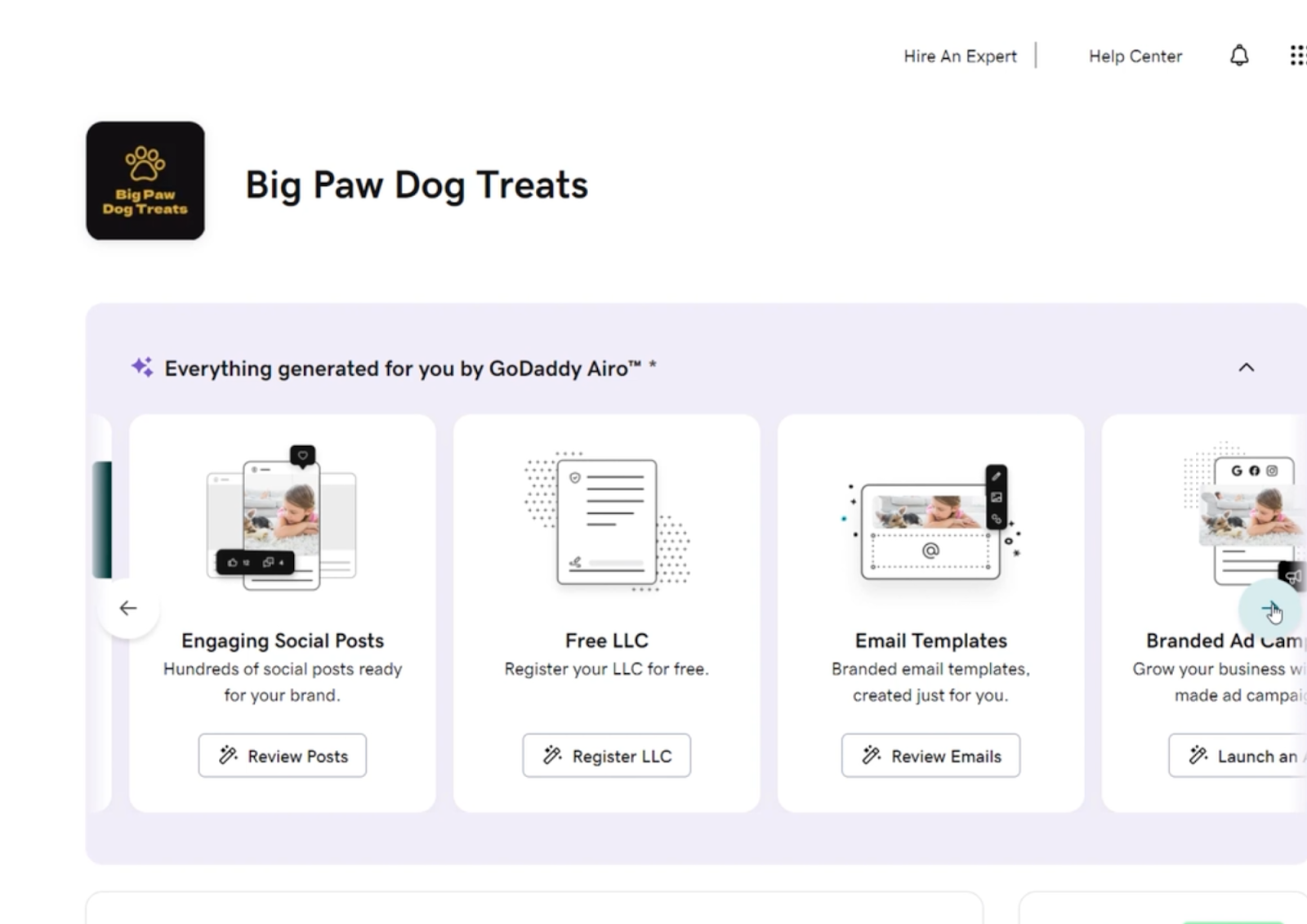
Caption: Purchasing a domain from GoDaddy grants you access to GoDaddy Airo, an AI-powered suite of features that help you set up an online business.
Try GoDaddy’s AI domain generator to find available domain names and choose the right one for your business. Your new domain will come with GoDaddy Airo – our AI-powered solution that instantly creates a website, logo, email, and more for your brand.
The design work isn’t the only thing that will cost you. When building a website, you will also need to think about things like which web hosting company you will go for, and which content management system (CMS) you will choose to manage your web pages. And let’s get started on picking the right domain name.
2. Web hosting
- Web hosting: Where your site “lives” online. Reliable hosting improves user experience, SEO rankings, and security.
- Pricing: SGD 100–500/year (shared hosting), SGD 800+/year (managed or cloud hosting)
A website consists of several different computer files that need to be stored somewhere. And that somewhere, is a web server.
Getting web hosting from hosting providers like GoDaddy is the first step to establishing your online presence.
Web hosting involves paying a company such as GoDaddy to host your website on their servers on your behalf. The cost of hosting varies greatly – currently, in Singapore, the costs range between SGD 8 and SGD 35 per month (excluding virtual private servers and dedicated servers), although there are special offers that can make set-up costs for your site lower.
Web hosting prices vary so much because of the different types of packages on offer, and the package you need will depend on your business requirements.
General rule of thumb. Go for the options that best serve your needs. If you are running an e-commerce store, then an e-commerce-specific web hosting plan would be more suitable. And e-commerce platforms like WooCommerce would be your go-to CMS. Oh, and please do not go for a free web hosting plan. It is bad for your site.
3. Website security
- SSL certificate: Secures data transfer (https). Essential for ecommerce websites and search engine optimization.
- Pricing: Often free with hosting, or SGD 50–150/year for premium SSL
You need to ensure your site is secure. It's highly recommended to use an SSL certificate to protect your website, and you might also consider investing in additional website security software.
SSL certificates are important because they protect user data by encrypting the connection between a server and a browser, ensuring privacy and security.
In Singapore, the cost of SSL certificates varies based on the level of security and the provider. Basic SSL certificates can start from around SGD 50 per year, while more advanced options can go up to SGD 500 per year. It's important to choose a certificate that fits your specific security needs and budget.
4. Website design & development
- Design: Visual layout, branding, responsive design for mobile devices, high-quality user experience.
- Development: Coding, CMS setup, plugins, and integrations.
Insight: Custom animations, advanced features, and interactive elements increase web development costs.
Other costs to consider to build a website in Singapore
Savvy business owners look beyond upfront pricing to account for hidden costs and ongoing maintenance. Here is a list of additional cost you'll need to factor in as part of your website building and maintenance.
1. Content creation (copywriting, images, video)
- Copywriting: SGD 100–300/page by a professional copywriter.
- Stock images: SGD 5–20 each, or free from Unsplash/Pexels.
- Custom photography/video: SGD 500–2,000+ per shoot
Tip: Quality website content is vital for SEO and engaging potential customers.
2. Maintenance & ongoing support
- Website maintenance: Regular updates, plugin patches, troubleshooting, and security.
- Ongoing costs: SGD 50–300/month (agency/freelancer support)
Pro tip: Always budget for ongoing maintenance to ensure your site stays secure and effective as your business evolves.
3. SEO & digital marketing
- SEO setup: SGD 500–3,000 (on-page optimization, keyword research)
- Ongoing SEO: SGD 300–2,000/month (content creation, link-building, analytics)
- Digital marketing: Social media, PPC ads, email campaigns—priced separately
4. Security updates & website backups
- Security plugins: SGD 100–300/year
- Automated backups: SGD 50–200/year
- Hacking recovery: Can cost thousands if not properly managed
Insight: Many small business websites in Singapore overlook security, exposing themselves to unnecessary risk and downtime.
5. Third-party app integrations, plugin and extensions
Beyond your website, you might need other features that goes beyond the scope of your initial website build. For example, to add specific functionalities to your website, you may need to buy premium plugins or extensions that aren't available for free. To track your website's performance and user behavior, you might invest in advanced analytics tools beyond the free ones available.
- CRM, analytics, email marketing: SGD 20–200/month per tool
- Custom integrations: SGD 500–3,000+ (one-off)
Tip: Start with essentials, add advanced features as your business grows and your needs evolve.
6. Professional email and email hosting
If you want a professional email address that matches your domain name (e.g., info@yourbusiness.com), you may need to purchase email hosting.
7. Legal review
Depending on the nature of your business and website, you may need to consider costs relating to copyright, compliance, or consultation with a legal expert, particularly for privacy policies, terms of service, and GDPR compliance.
Website design pricing at a glance: Web Designer vs Website Builder vs WordPress
| Feature | With a web designer | With GoDaddy's Website Builder (Basic) | With WordPress |
| Design | $200+ | n/a | n/a |
| Website Builder annual cost | n/a | $143.88 | n/a |
| Web hosting | $150+ | included | $143.88 |
| Domain name | $20/year | $20/year | $20/year |
| SSL certificate | $70/year | included | $70/year |
| Maintenance | $200/year | n/a | n/a |
| Cost in first year | $640 | $163.88 | $233.88 |
| Ongoing annual cost | $440 | $163.88 | $233.88 |
A website builder, a web designer, and WordPress can all help you to create a great website. The main advantage of a website builder is that it is cheaper, while a web designer will help you achieve a unique look for your site. WordPress is another excellent DIY option with a much wider range of options versus a website builder.
How much does it cost to design a website with GoDaddy?
In Singapore, the cost of creating a website with GoDaddy varies based on the plan you choose. The Basic plan starts at SGD 9.99 per month, the Premium plan costs SGD 14.99 per month, and the E-commerce plan is priced at SGD 20.99 per month, with all prices based on annual subscriptions.
These plans include web hosting, mobile editing, and marketing tools, making GoDaddy a cost-effective option for building a website.
| Service Provider | Initial Cost | Ongoing Cost |
| Web Design Agency | SGD 6,000 | SGD 1,000 annually |
| Freelancers/Independent Contractors | Varies (SGD 25 - SGD 200/hour) | Varies (dependent on project scope) |
| DIY (Do It Yourself) | Hosting: SGD 10 - SGD 50/month | Domain: SGD 10 - SGD 15/yearWebsite Builder: SGD 5 - SGD 50/month |
| With GoDaddy's Website Builder | N/A | SGD 9.99 - SGD 29.99/month |
| With WordPress | Hosting: SGD 10 - SGD 50/month | Domain: SGD 10 - SGD 15/yearAdditional Plugins: Varies |
Website costs by business type
The cost for a website depends heavily on the functionality required for the website. This includes ecommerce capabilities, number of pages and content types used (videos, podcasts, image galleries, etc). Check out the table below for very generalized pricing based on business type.
| Business Type | With a Web Designer | With GoDaddy's Website Builder | With WordPress |
| Small business website | SGD 864+ | SGD 194.65 | SGD 194.65 |
| Small to medium ecommerce site | SGD 6,750+ | SGD 405.28 | SGD 276.01 |
| Large-scale ecommerce site | SGD 13,500+ | SGD 486.71 | SGD 486.71 |
| Large bespoke business site | SGD 20,250+ | SGD 486.71 | SGD 486.71 |
Design your dream website with GoDaddy today
Building a website is one of the most impactful investments you’ll make as a business owner in Singapore. Whether you’re launching a small business website with a freelancer, developing a custom ecommerce site with a web design agency, or starting with a DIY template, understanding the key factors that drive website design pricing will help you make smarter choices.
Remember, a professional website is your digital storefront, your lead generator, and your 24/7 brand ambassador. Don’t be tempted to cut corners—invest in quality web design, clear website content, and reliable web hosting. Consider your long-term business goals, scalability, and the ongoing maintenance required to keep your site secure and effective.
Ready to boost your online presence? Start by defining your must-have features, choosing the right provider, and preparing your content. With the insights from this guide, you’ll be equipped to build a high-quality, user-friendly website that attracts potential customers, ranks on search engines, and grows your business in Singapore’s digital landscape.
Whether you are a small business owner looking to grow your online presence or a freelancer who needs a professional website to showcase your work, GoDaddy has just the right tools for you. With plenty of custom designs and templates, hosting plan options and more, you no longer have to sacrifice quality just because it doesn’t fit your budget.
The best part? Your website cost is kept at a minimum until you are ready to make a heavier commitment. Create your own website today with GoDaddy’s Website Builder! It’s easier than you think.
Pricing is correct at the time of publishing and do not include any special promotions or discounts. Be sure to check current prices.
FAQ about website costs
Can you build a website for free?
Yes, a business owner can technically build a website for free using various website building platforms. For instance, WordPress.com offers free plans. However, these free plans come with limitations such as subdomains (e.g., yourwebsite.wordpress.com), lack of customization, limited storage, and often the presence of ads on your website. So while a free plan might suffice for a small or start-up business, as the business grows, using a paid hosting plan would be necessary to provide a more professional appearance and enhanced functionality.
How much does it cost to create a one-page website?
The cost of creating a website can vary greatly depending on several factors such as the platform you use, design complexity, additional functionalities, and whether you hire a professional web developer. In general, you can expect to pay anywhere from $500 to $5,000 for a one-page website. However, there are a number of ways to reduce the cost, such as:
- Using a website builder
- Hiring a freelancer or small agency
- Doing some or all of the work yourself
Is it worth having a website for a small business?
Absolutely, having a website for a small business is worth it and highly recommended. A website offers several benefits:
- Accessibility: Your potential customers can learn about your business, products or services any time, from anywhere.
- Credibility: A professional-looking website can enhance your business reputation and instill trust in potential customers.
- Marketing: A website is a powerful marketing tool where you can promote your business widely and cost-effectively. It also allows for digital marketing strategies such as SEO, content marketing, and email marketing to attract more customers.
- Sales: With an ecommerce functionality, a website can act as an additional sales channel, allowing customers to purchase directly from you 24/7.
- Customer Service: You can provide improved customer service through a website by offering FAQ sections, chatbots, or forums where customers can get answers to their queries.
- Business Growth: A website helps you reach a wider audience, expand your customer base, and drive business growth.
Remember, your competitors are likely to have a web presence. A well-designed, user-friendly website can give your business a competitive edge.
How much does it cost to run a website for 1 year?
The cost of running a website for 1 year varies widely, depending on several elements. Depending on your business' needs, a paid website can cost anywhere from $190 per year to thousands of dollars.
What ongoing maintenance costs should I budget for?
Website maintenance fees in Singapore usually range from SGD 50–300/month. This covers plugin updates, security patches, backups, and minor revisions.
What hidden costs should I watch out for?
Watch for costs such as domain name renewal, SSL certificate, premium plugins, content creation, advanced features, and digital marketing. Always clarify what’s included in your contract to avoid surprises.
Editor's Note:This article also contains content written by Stacey Hartman. It was first published on 30 June 2024 and updated on 23 May 2025 and 23 December 2025.
